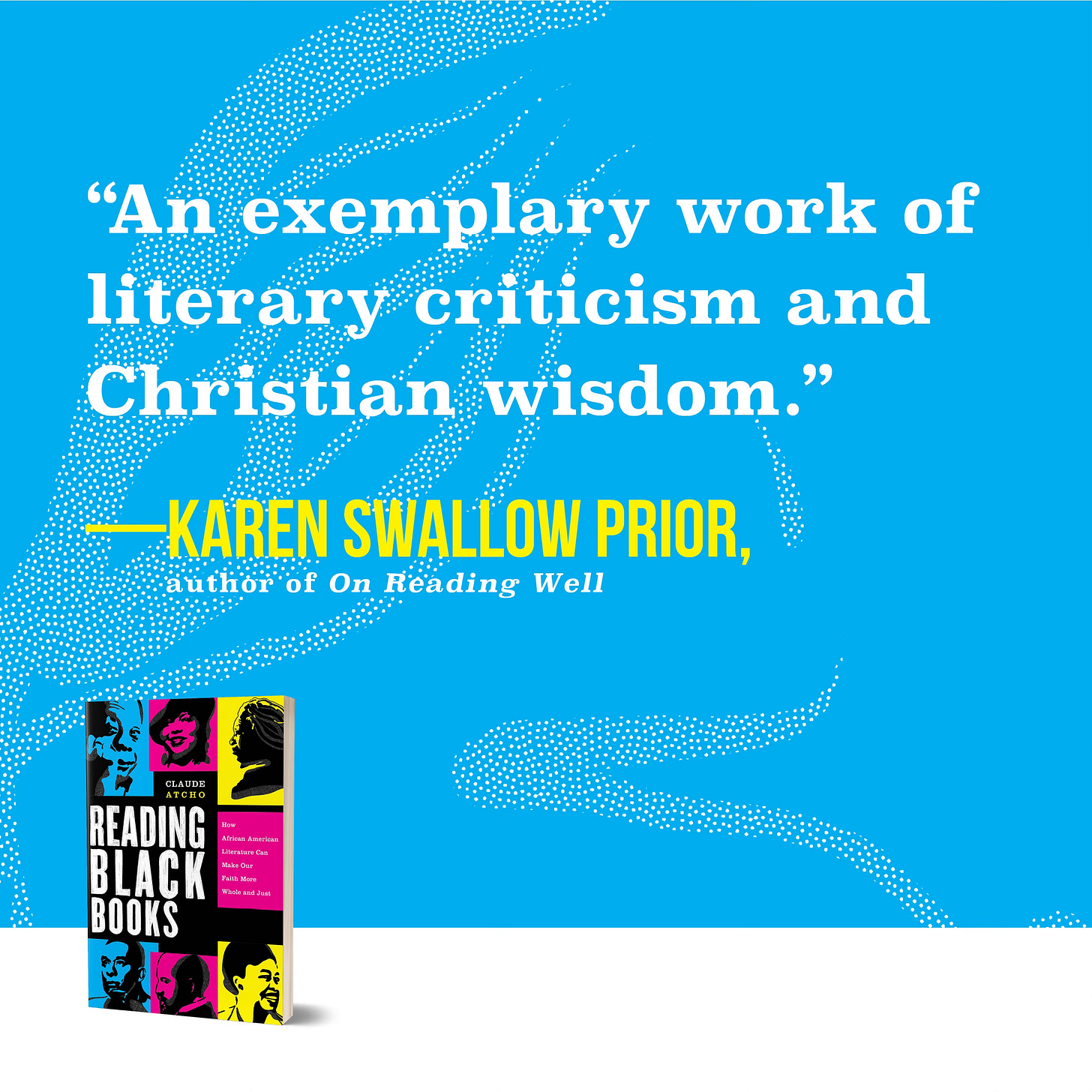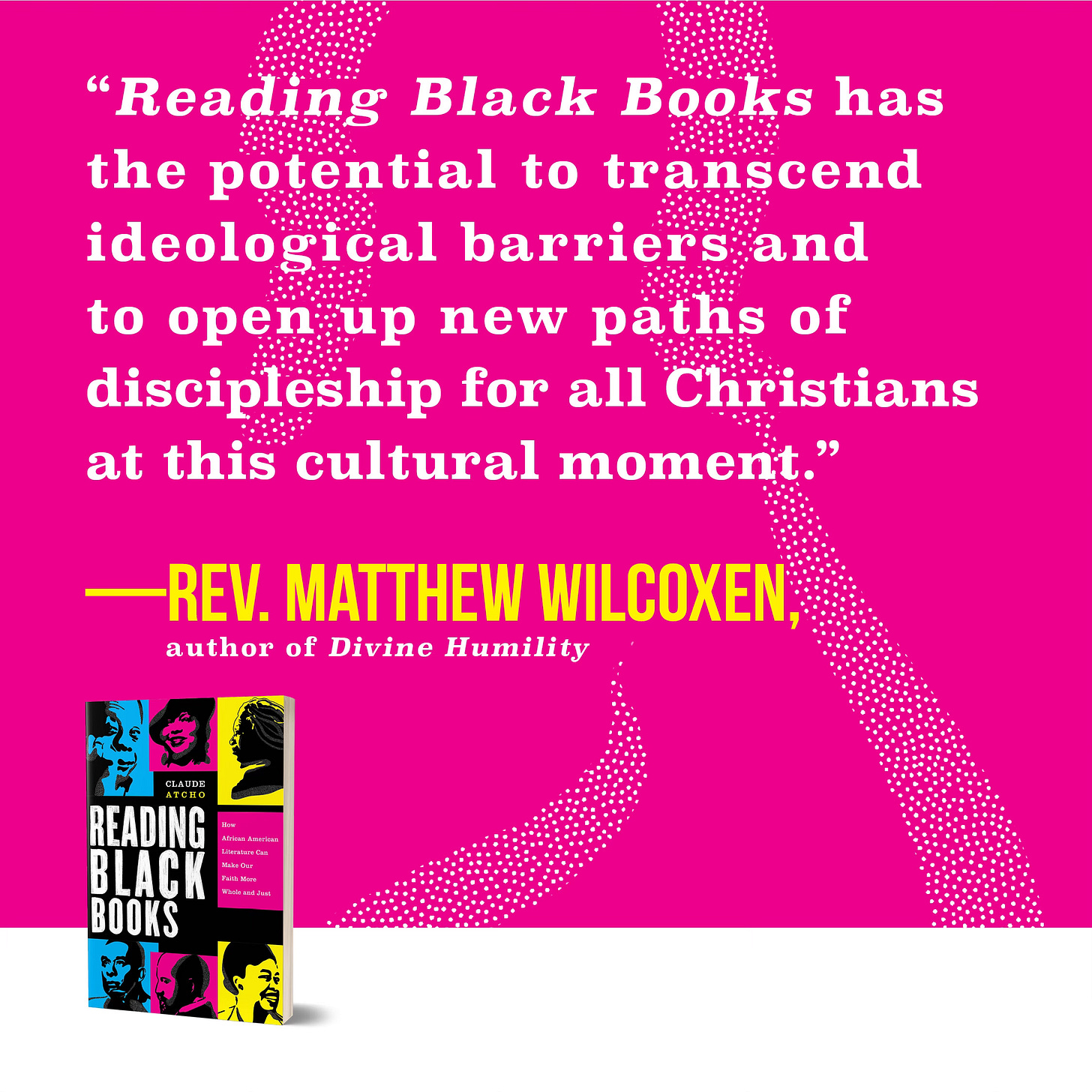Three Spiritual Insights from Reading Black Books for 2025
Returning to and learning from black literature for "this cultural moment"
Weird to say, but it has crossed my mind that perhaps my first book is more important now than at the time of its release.
Various distortions of Christian faith intermingled with power lust and the persistent need for the practice of lament have led me to return to my own words to find fresh wisdom from the tried and true texts I engage with in Reading Black Books.
The book is my attempt to show the value of black literature for the life of faith. Really the subtitle say it all: “How African American Literature Can Make Our Faith More Whole and Just.”
I think this book might be good and timely for you and yours, too.
I’ve lined up three quotes that I trust will be edifying or at minimum stimulating for your mind and spirit.
1. The Primacy of Love
2. Combating Racism
3. The Lifeblood of Injustice
The Primacy of Love
Is Christianity a source of sustenance or suffocation? I think that’s the most pressing and fascinating question at the heart of James Baldwin’s Go Tell It On The Mountain.
I engage the novel to explore how loveless conceptions of God emerge and evolve and how grasping God as revealed in Jesus is the only way to break free.
From my chapter on God and Go Tell It On The Mountain:
Our ability to obscure the primacy of love is proof that we have kept closer company with self- interest and power than with Christ and Scripture. But power is not Lord; Jesus is. And there is nothing more urgent and central for the people of God than a life of love.
This means that love, not in a sentimental sense but in a serious, radical, Christian sense—that is, a Christ-like sense— must be recentered as the shape and substance of both our faith and our living. A return to a faith marked by love is a return to a faith centered on Jesus. Did not Jesus say that the world would know we are his disciples not by our power but by our love? Did not Jesus sum up the Father’s will for us in the inseparable call to love both God and neighbor? Indeed, if we are to believe the apostle Paul, love, more so than knowledge, is proof of our abiding knowledge of the triune God (1 Cor. 8; 13).
Combating Racism
Racism as we know it in our historical-cultural context as Americans is caused largely by Christians and yet it is in Christianity proper that the medicine which heals and destroys racism is found in its most potent form. Yeah, I get into a lot in this chapter.
From my chapter on Racism exploring Nella Larsen’s Passing:
A shallow grasp of race and history leads Christians to fight racism as if it were a single skirmish on the individual battlefield of personal emotion and nicety without realizing the battle is part of a complex war fought on fronts beyond what we can see: our imaginations, our assumptions, our notions of difference, our systems, and among principalities and powers.
Christianity’s ethic of repentance demands the interrogation of self and system in ways few find comfortable. Comforting the comfortable may be why so many contemporary churches are quiet and confused on these matters of life and death, failing to drive the stake of the imago Dei into the heart of racial hierarchy by declaring with equal force the dignity of all persons and the myth of racial difference/hierarchy and the reality of racism. Attacking only one is nearly as impotent as addressing none.
The Lifeblood of Injustice
What’s really behind racism and racial injustice is the twisted face of greed. Rev. Malcolm Foley’s new book looks excellent and incisive and tackles this very subject. I speak to it through the journey of Wright’s protagonist, Fred Daniels.
The stronghold of greed is part of the lifeblood of injustice.
From my chapter on Richard Wright’s The Man Who Lived Underground:
The stronghold of greed is part of the lifeblood of injustice. The novel makes this point when Daniels finds his way into the basement vault of a real estate and insurance firm, which “collected hundreds of thousands of dollars in rent from poor colored folks.” Daniels takes money from their vault, “not to spend, but just to keep around and look at it.” He rubs the money “as though expecting it suddenly to reveal secret qualities,” after which he smiles and observes, “It’s just like any other kind of paper.” The bills that Daniels examines are neither holy nor evil but a means and a motive for goodness or greed, justice or injustice.
It is the love of money that produces all manner of evil and injustice (1 Tim. 6:10). Wealth and economics are, as Marva Dawn writes, “perhaps the dimension[s] in which Western Christianity is most often subverted by the powers.” Dawn asks the sort of arresting question that a just faith requires: “If so much of the Bible deals with wealth and the problems of mammon and with such strong invitations to give, then why are our churches so rich? . . . Why have we made mammon such a god in our personal and corporate lives?” Will we let such questions interrogate us or will we erect defenses that keep these questions out of mind?





